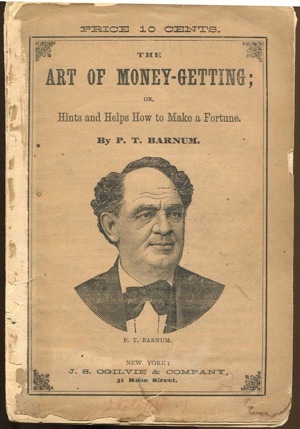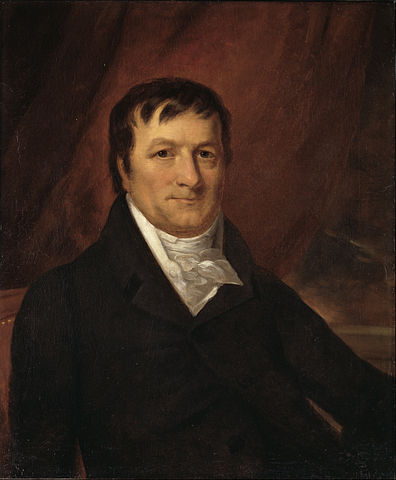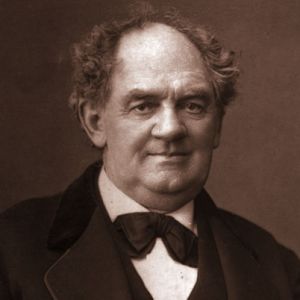P.T. Barnum’s Forgotten Book “The Art of Getting Money” – Ch. 8
We are doing a series here at BBH on The Art of Getting Money, a little-know book from P.T. Barnum wrote back in 1880.
Why? A couple reasons. First, because there’s a movie coming out December 25, 2017, starring Hugh Jackman, called The Greatest Showman.
It’s a musical about the life of P.T. Barnum.
I don’t know a lot about the movie yet, but it looks pretty good from what I’ve seen in the trailer…
The Greatest Showman – Official Trailer
P.T. Barnum’s Little-Known Book from 1880
So I thought it’d be cool to feature his little-known book The Art of Money Getting or Golden Rules for Making Money (It’s in the public domain, so it’s ok for me to post it on this site)
Some of you might not know this, but Barnum is FALSELY known for saying, “There’s a sucker born every minute,” (He actually didn’t say that.)
The second reason I thought it would be good to do this is series is because this book contains some surprisingly practical and helpful advice on how everyday people can better manage their income and increase their wealth.
The book is 137 years old, but much of the advice he gives is still applicable to all of us today.
That’s why I’ve decided to post a new segment of the book once a week here on BayBusinessHelp.com.
Today you will be able to read chapter 1 about choosing your vocation (i.e. what you do for a living).
Reminder of 4 Things Before You Read the Book
1. DISCLAIMER:
I don’t agree with everything that P.T. Barnum did during his life.
I also don’t agree with every single thing he wrote in his book.
I don’t even agree that wealth is, or should be, the primary goal in life. (There are plenty things that are more important than wealth!)
But I DO believe that all of us can benefit from learning how to better handle the money (however small or great) that flows in and out of our hands.
And this book contains some advice that I think you will find both interesting and helpful for you when it comes to how to better handle your money.
2. MY ADVICE TO READERS:
Take the good advice and leave the bad!
3. THE ONLY CHANGES I’VE MADE:
The only changes I’ve made to the text are:
- I’ve broke many of the paragraphs into smaller chunks of text to make it easier to read.
- I’ve also bolded or italicized sections of the text to help them stand out to the reader.
- I also occasionally include a modernized word to help the reader understand an old school word or phrase that Barnum uses.
- And I’ve also added some headers to the text, made some quotes stand out, and bulleted some of his points to make sections stand out for the reader.
4. SOME OF IT MIGHT BE OFFENSIVE
Because of the way spoke and thought back in the 1800’s compared to now, you shouldn’t be surprised if some of the content is offensive to our current standards and way of thinking.
If you can’t just ignore this, like I do, and you will be offended, then you probably shouldn’t read any of the posts from this series. 🙂

What We’ve Covered So Far
If you missed the previous posts in this series, you can read them here:
Introduction to The Art of Money Getting
— The Art of Money Getting – Chapter 1: Right Vocation
— The Art of Money Getting – Chapter 2: Right Location
— The Art of Money Getting – Chapter 3: Avoid Debt
— The Art of Money Getting – Chapter 4: Persevere
— The Art of Money Getting – Chapter 5: Whatever You Do, Do It With All Your Might
— The Art of Money Getting – Chapter 6: Depend Upon Your Own Personal Exertions
— The Art of Money Getting – Chapter 7: Use the Best Tools
Today’s chapter is a long one. In fact it’s so long that I have broken it into two parts. Below is Part 1.
I think you’re going to really like it, so let’s get right to it…
— The Art of Money Getting: Chapter 8: DON’T GET ABOVE YOUR BUSINESS PT I —
The Lies Young “Wanna Be” Entrepreneurs Tell
Young men after they get through their business training, or apprenticeship, instead of pursuing their avocation and rising in their business, will often lie about doing nothing.
They say; “I have learned my business, but I am not going to be a hireling; what is the object of learning my trade or profession, unless I establish myself?‘”
“Have you capital to start with?”
“No, but I am going to have it.”
“How are you going to get it?”
“I will tell you confidentially; I have a wealthy old aunt, and she will die pretty soon; but if she does not, I expect to find some rich old man who will lend me a few thousands to give me a start. If I only get the money to start with I will do well.”
They Make No Greater Mistake This This One
There is no greater mistake than when a young man believes he will succeed with borrowed money. Why?

John Jacob Astor
“It was more difficult for him (John Jacob Astor) to accumulate his first thousand dollars, than all the succeeding millions that made up his colossal fortune.”
Because every man’s experience coincides with that of Mr. Astor, who said, “it was more difficult for him to accumulate his first thousand dollars, than all the succeeding millions that made up his colossal fortune.”
Money is good for nothing unless you know the value of it by experience.
Give a boy twenty thousand dollars and put him in business, and the chances are that he will lose every dollar of it before he is a year older.
Like buying a ticket in the lottery; and drawing a prize, it is “easy come, easy go.” He does not know the value of it; nothing is worth anything, unless it costs effort.
Without self-denial and economy; patience and perseverance, and commencing with capital which you have not earned, you are not sure to succeed in accumulating.
Young men, instead of “waiting for dead men’s shoes,” should be up and doing, for there is no class of persons who are so unaccommodating in regard to dying as these rich old people, and it is fortunate for the expectant heirs that it is so.
The Best Way to Acquire a Fortune
Nine out of ten of the rich men of our country to-day, started out in life as poor boys, with determined wills, industry, perseverance, economy and good habits.

They went on gradually, made their own money and saved it; and this is the best way to acquire a fortune.
- Stephen Girard started life as a poor cabin boy, and died worth nine million dollars.
- A.T. Stewart was a poor Irish boy; and he paid taxes on a million and a half dollars of income, per year.
- John Jacob Astor was a poor farmer boy, and died worth twenty millions.
- Cornelius Vanderbilt began life rowing a boat from Staten Island to New York; he presented our government with a steamship worth a million of dollars, and died worth fifty million.
“There is no royal road to learning,” says the proverb, and I may say it is equally true, “there is no royal road to wealth.”
But I think there is a royal road to both.
The road to learning is a royal one; the road that enables the student to expand his intellect and add every day to his stock of knowledge, until, in the pleasant process of intellectual growth, he is able to solve the most profound problems, to count the stars, to analyze every atom of the globe, and to measure the firmament this is a regal highway, and it is the only road worth traveling…
